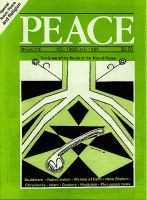
Peace Magazine Dec 1988-Jan 1989, page 10. Some rights reserved.
Search for other articles by Maxime Faille here
FOR MANY YEARS, Canada had put the pursuit of a Comprehensive Test Ban (CTB) as its top priority in arms control Over the last three years, however, while boasting that it still is at "the forefront of those who seek a CTB," Canada has actually weakened its stand considerably. This can be shown by reviewing Canada's voting record and statements at the United Nations. I will do so here.
Canada's first priority is no longer the test ban, but "deep cuts" in current arsenals (as the U.S. calls for now , too).
* The Rt. Hon. Joe Clark said so himself in June at the U.N. Special Session on Disarmament: "First, deep and verifiable reductions in the arsenals of nuclear weapons must remain as the highest priority in international disarmament."
He also said, "the achievement of a Comprehensive Test Ban Treaty remains a fundamental and enduring objective for Canada." ("Enduring" indeed! With the current approach, the objective will "endure" well into the 21st century.)
Both at the 40-member Conference on Disarmament in Geneva and at the United Nations, Canada has failed to support calls for immediate negotiations for a CTB.
* At the 42nd Session of the U.N. General Assembly, Mexico put forward Resolution 42/26A, calling for a comprehensive test ban. Canada abstained. Instead, Canada co-sponsored a watered-down New Zealand resolution that called for more study of verification and monitoring. (This "more study" approach should sound familiar to Canadians, especially with respect to acid rain.)Despite this ingratiating gesture, neither the United States nor France voted for even such a bland resolution as the one Canada co-sponsored.
After having walked out of test ban negotiations for eight years, the Reagan administration responded to strong U.S. Congress pressure by enticing the Soviets into so-called "stage-by-stage" negotiations. These negotiations aim to improve verification measures in order to ratify two 1970s treaties that limit the explosive force of testing. Since both countries have already been observing the limits imposed by the treaties, and since the means of verification are already adequate, these negotiations amount to, in the words of Sen. Edward Kennedy, "diplomatic busy-work."
Recent evidence shows that the Reagan administration has no intention of limiting tests. A Reagan report to Congress insists that "we do not regard testing as an evil to be curtailed," and that indeed, "under deep reductions [of nuclear weapons]. . . the need for testing could be even greater."
What then is the real motive for these negotiations? According to the Scientific American, White House officials privately admit that "by creating the appearance of progress towards a test ban, they hope to divert attention from genuine test-ban proponents and so reduce their momentum."
It is this blatant, admitted deceit Canada that has wholeheartedly supported. The government is deluding itself if it believes it is "nudging the Americans along" toward a CTB. The only net result is that it is isolating itself from the non-nuclear world that truly wishes to see a test ban. If Canada is serious about attaining a CTB, it has a golden opportunity to do so.
On August 5, 1988, on the 25th anniversary of the signing of the Partial Test Ban (PTB) six non-nuclear states (Indonesia, Mexico, Peru, Sri Lanka, Venezuela) formally submitted a request for an amendment to the PTB to convert it to a CTB. Canada abstained on previous resolutions calling for this unprecedented action.
Once one-third of the parties to the treaty (39) have requested convening a conference to consider such an amendment, the depositary governments will be obliged to do so, and multilateral comprehensive test ban treaty negotiations will be on track.
* This approach was initiated by Parliamentarians Global Action. In a letter to that organization's president, Dr. Olafur Ragnar Grimsson, Mr. Joe Clark has already expressed Canada's opposition to the amendment conference because "a negative outcome would be virtually fore-ordained." (Canada instead supports the "stage-by-stage approach" and the Conference on Disarmament in Geneva, whose "negative outcomes" are already upon us.)
The Amendment Conference still offers Canada a chance to work to end testing once and for all. So be it!

Peace Magazine Dec 1988-Jan 1989, page 10. Some rights reserved.
Search for other articles by Maxime Faille here